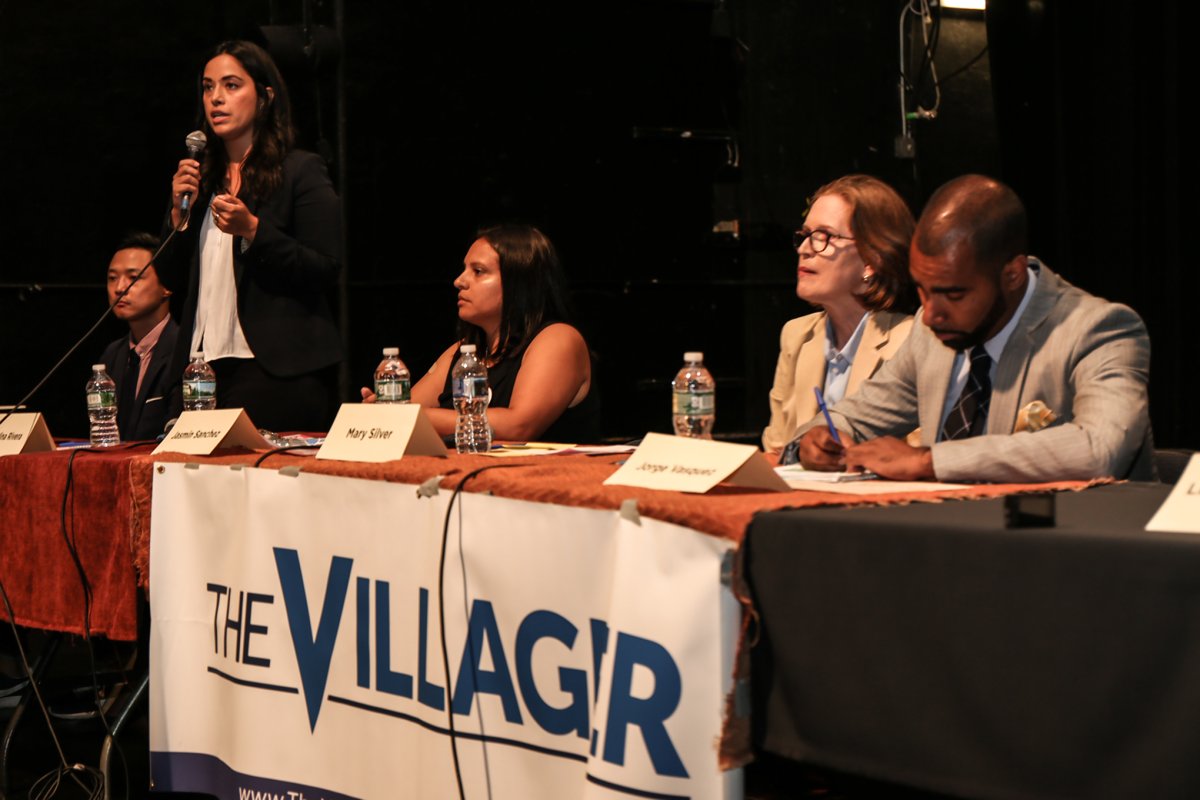
BY LINCOLN ANDERSON | The five Democratic candidates remaining in the race for the City Council District 2 primary election held forth on a wide range of community, citywide and national issues at a debate hosted by The Villager at Theater for the New City on Mon., Aug. 21.
More than 100 people turned out for the event, which was graciously hosted by the renowned East Village theater and its director, Crystal Field.
The candidates included Carlina Rivera, the race’s presumed frontrunner, who was formerly Councilmember Rosie Mendez’s legislative director and has the overwhelming support of local politicians; education advocate Mary Silver; Lower East Side activists Jasmin Sanchez and Jorge Vasquez; and Ronnie Cho, who was President Obama’s director of Millennial Outreach.
Rivera appeared to have the most support at the event, as well, judging by the many people in the audience wearing her white campaign T-shirts, including her husband, Jamie Rogers, chairperson of the East Village’s Community Board 3. Vasquez, however, had one particularly vocal supporter — his mom — who cheered him on throughout the two-hour event.
The event was co-moderated by Lincoln Anderson, editor of The Villager, and Paul Schindler, editor of Gay City News, a sister paper of The Villager.
Candidates were asked their position on the Right to Know Act — a package of bills that would require police to identify themselves and explain their interaction with people during nonemergency encounters. They all endorsed the bills.
They were also asked what they think the solution is to the two decades-long stalemate over the old P.S. 64, the former CHARAS / El Bohio community and cultural center, at E. Ninth St. near Avenue B.
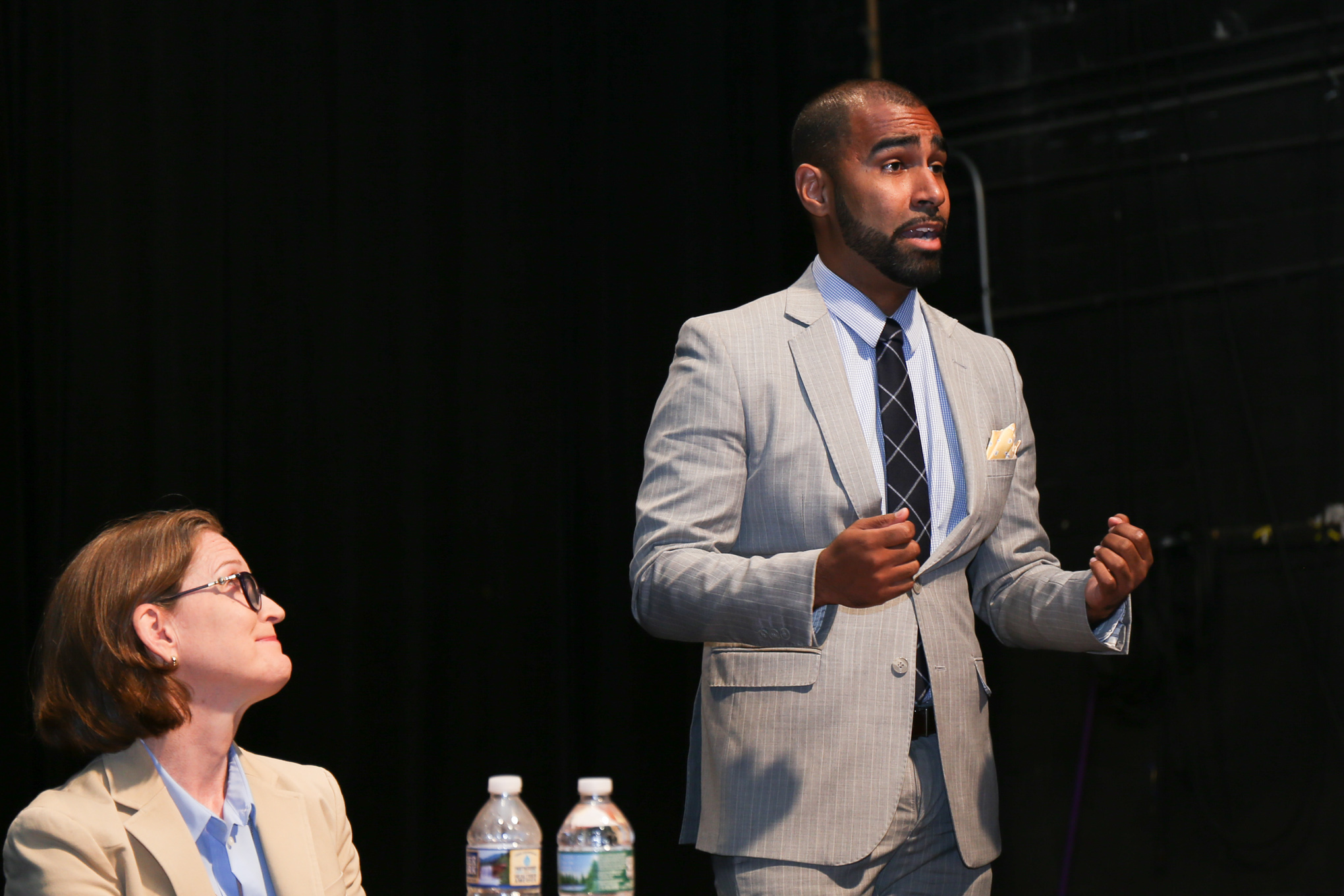
Rivera said she would be the best one to bring all parties, including building owner Gregg Singer, to the table to reach an agreement. Mendez has said that the way the community could get the building back would be through eminent domain; though the city would have to pay fair market value — possibly $40 million — for it, and would have to put forward a viable use.
“I thought Bloomberg would do that — that was kind of his thing,” Rivera reflected. “I’m going to sit across the table with this individual, so that we can truly find a community use” for the building, she said of Singer.
Sanchez noted there are several old bathhouses in the district on public-housing grounds that are also sitting abandoned and that should be renovated. She blamed Mendez for not funding the renovation of the bathhouse at the Baruch Houses — where Sanchez grew up and lives — and that today “there’s a tree growing out of it.”
For some reason, Vasquez, who is an attorney, said the city, at some point, had missed a chance to purchase the building for $120,000 — though it was unclear where he got that extremely low figure. The building was purchased by Singer at a city auction for $3.2 million in 1998.
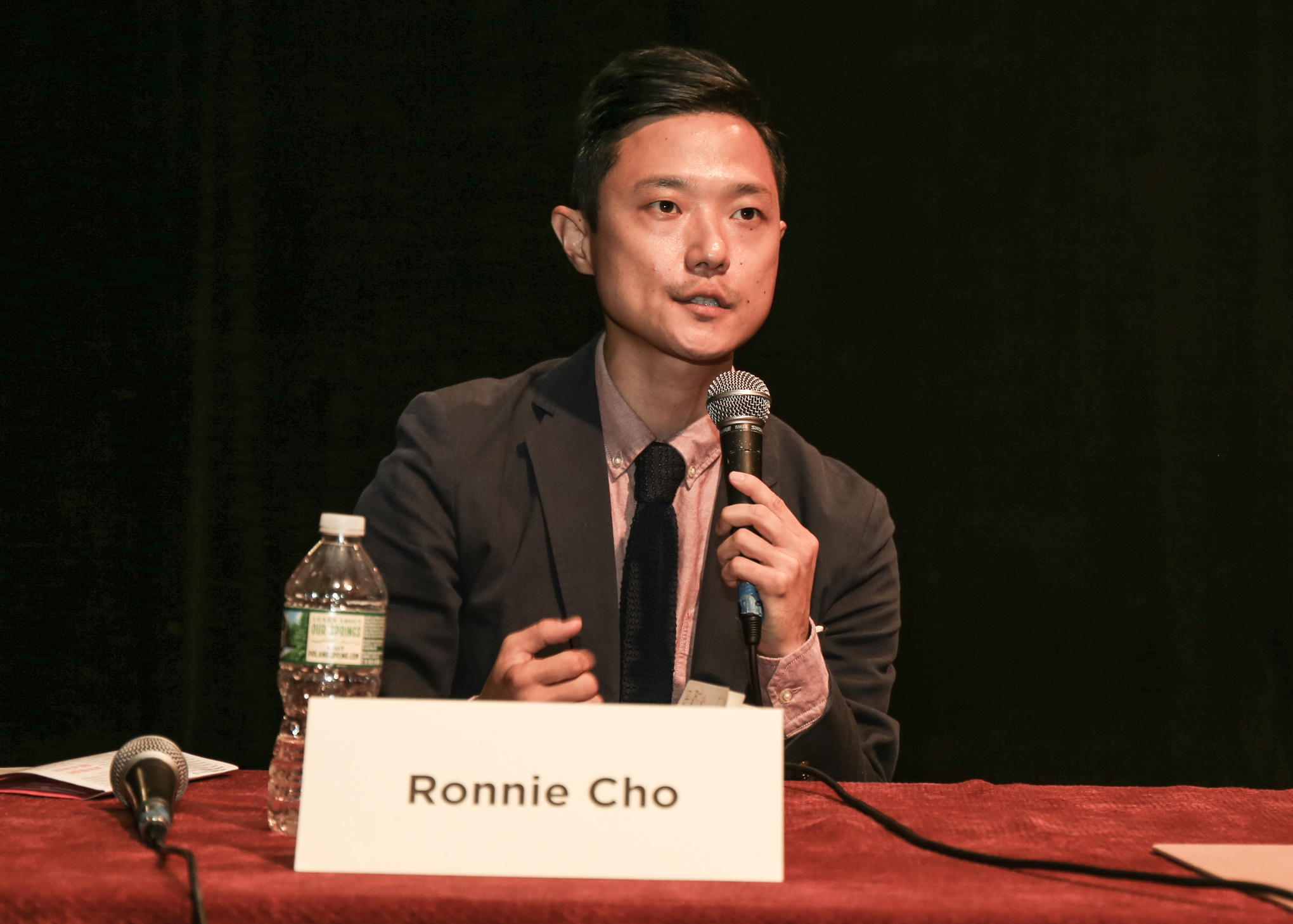
Silver said it was time to revitalize the vacant former school building, which she derided as a “tomb.”
“It’s insane that that building has been paralyzed for 20 years,” Silver said.
Sanchez, calling herself the “youth development candidate,” several times touted her work on behalf of young people.
On the other hand, Silver, who is the oldest candidate in the race, a couple of times stressed that programs also have to consider the needs of seniors. She received a law degree from New York University School of Law and raised three daughters in the district, all of whom attended public schools. Silver also advocated for the creation of the new River School in Murray Hill.
“I’ve been working in the district 25 years,” she said.
She said she was urged to run by the district’s principals and teachers.
Cho said he represents “a new generation of leadership.” As opposed to the other candidates, he doesn’t have a long history here, having lived in the East Village for only about four years. Yet, one audience member from Gramercy, afterward said she liked how Cho “thinks outside the box.”
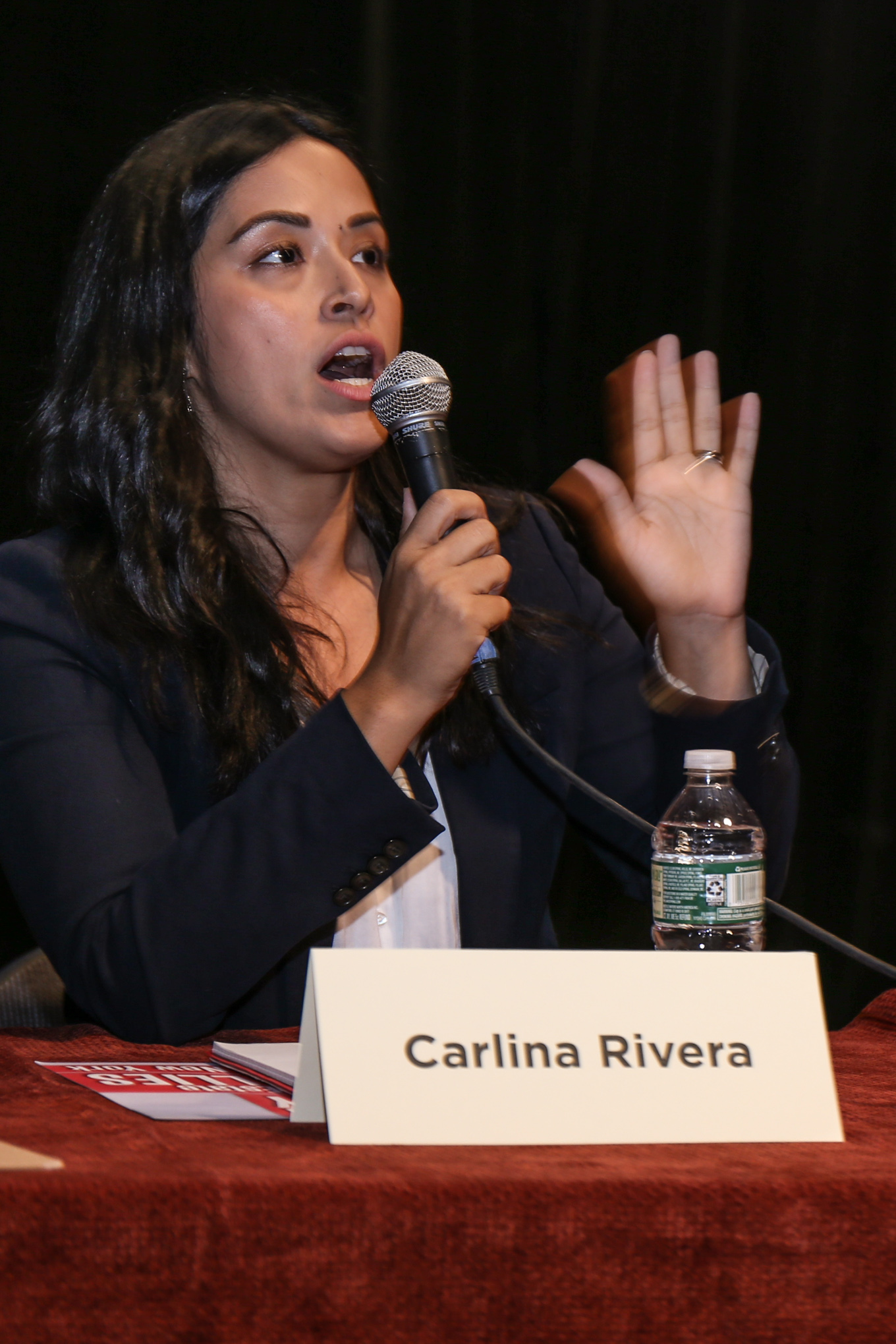
Rivera spoke of her neighborhood roots.
“This is where I learned to ride my bike, where I won basketball championships, where I fell in love, and where I have served,” Rivera said, noting she is a former Community Board 3 member. “I am someone who has spent my life building relationships and working in a collaborative way.”
Rivera noted that the district – which stretches from the Lower East Side public-housing developments up to the E. 30s — has tony areas, like Gramercy, mixed with “pockets of poverty.”
“I know this district corner to corner,” she said. “This is my home.”
“I’m a proud product of District 2,” Vasquez said. “Mine is a pure grassroots campaign,” he said, “We don’t owe no one any favors.”
Another question asked what the candidates think of Mayor Bill de Blasio, since the winner would have to work with him.
“I give de Blasio some credit on the education issue,” Silver said, noting how he got universal pre-K, and saying that former Mayor Bloomberg was so gung ho for charter schools. However, on affordable housing, she said the mayor is “not doing enough.” Referring to the 421-a program, she said, “We should not be giving tax breaks to real estate developers when we could be building affordable housing ourselves — not 20 percent, but 100 percent affordable housing.”
“Where is the Small Business Jobs Survival Act?” Vasquez demanded. “It hasn’t even hit the floor [for a vote]. Enough is enough!” Yet he gave the mayor credit for cutting down stop and frisk and addressing mental illness.
Cho said, “I don’t know what other choice we have for mayor. Unfortunately, we have a system that keeps those in power in power.”
The city should be a world leader in every area, but isn’t, Cho said, noting, “Why isn’t every one of our buildings covered in solar panels and green roofs? We just don’t have the guts.”
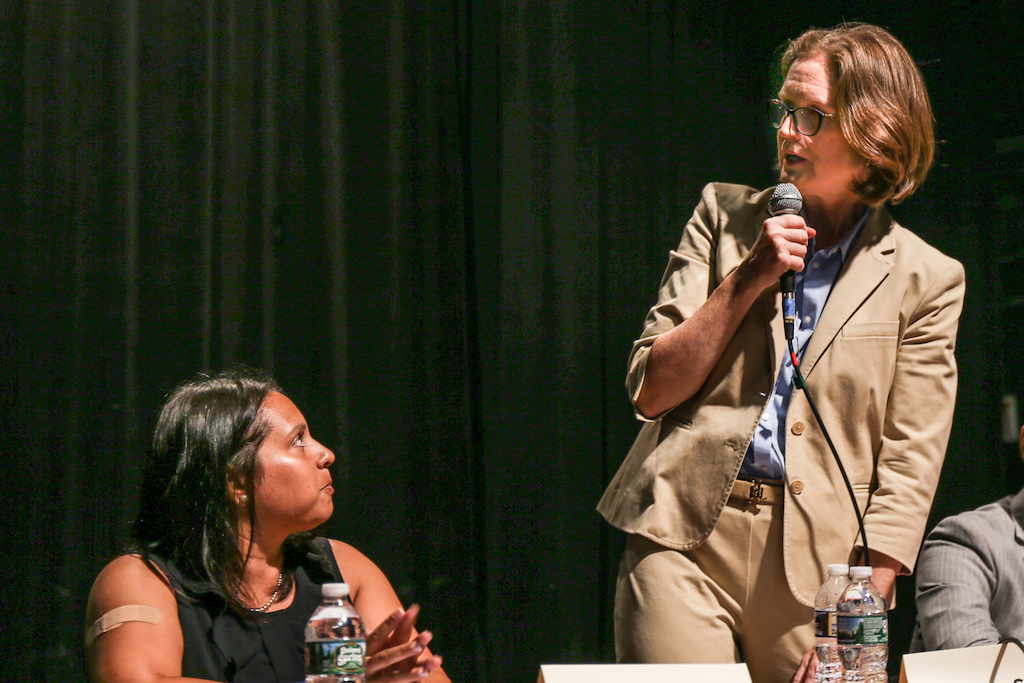
Rivera said “absolutely” the S.B.J.S.A. should be approved. And she said racial profiling by police must stop.
All the candidates said that police reform hasn’t gone far enough.
“ ‘Broken windows’ theory is broken,” Vasquez declared. “Enough is enough.”
Schindler asked the candidates how they would follow up the district’s past three councilmembers — who have all been openly gay or lesbian – in terms of working with the gay community.
“The district remains kind of one of the hometowns for the L.G.B.T. community in New York City,” he noted. All five said they would respect the district’s diversity and everyone’s sexual identity.
“This is still a city that has not passed legislation against gay-conversion therapy,” Cho noted.
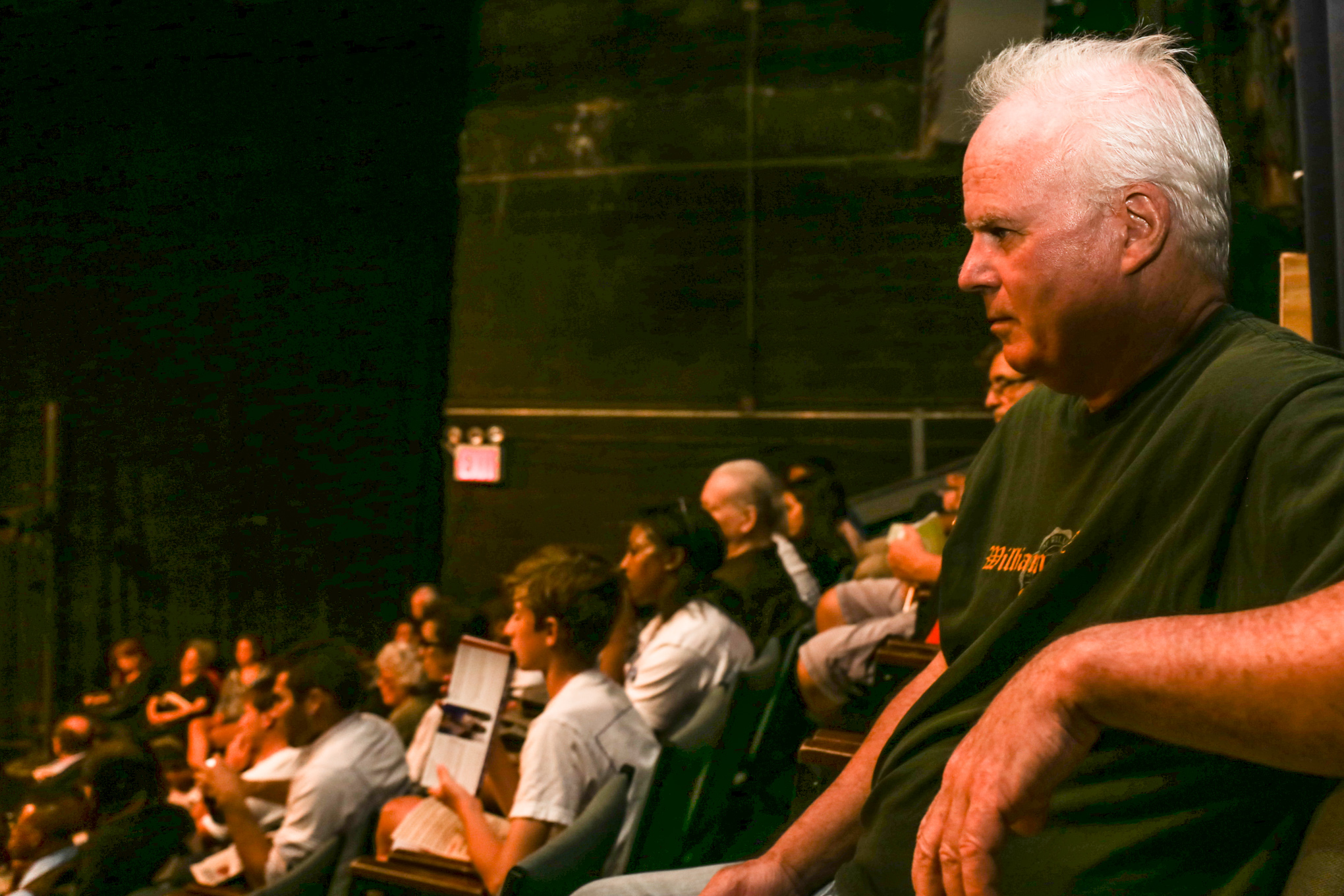
All five said they would work as part of “the resistance” against the Trump administration in D.C.
On the issue of Mt. Sinai Beth Israel Hospital downsizing and building a mini-hospital at E. 13th St. and Second Ave., the candidates expressed great concern. Silver, who noted she gave birth to her third daughter in a taxi, said the district needs facilities that can deliver babies. (Mt. Sinai has moved its obstetrics unit out of Beth Israel.)
“Seventy beds is unacceptable,” Rivera said of the planned mini-hospital. “And let’s think about the portfolio of land [at the hospital’s current E. 17th St. site]— is it going to be residential? Likely it will be, so that will be more people” needing healthcare.
Cho said the hospital downsizing plan “didn’t even go through an adequate needs assessment.”
“We know there are nonprofit mobile units — why aren’t they in our communities?” Vasquez said, stressing that all approaches must be explored and used to improve the area’s healthcare.
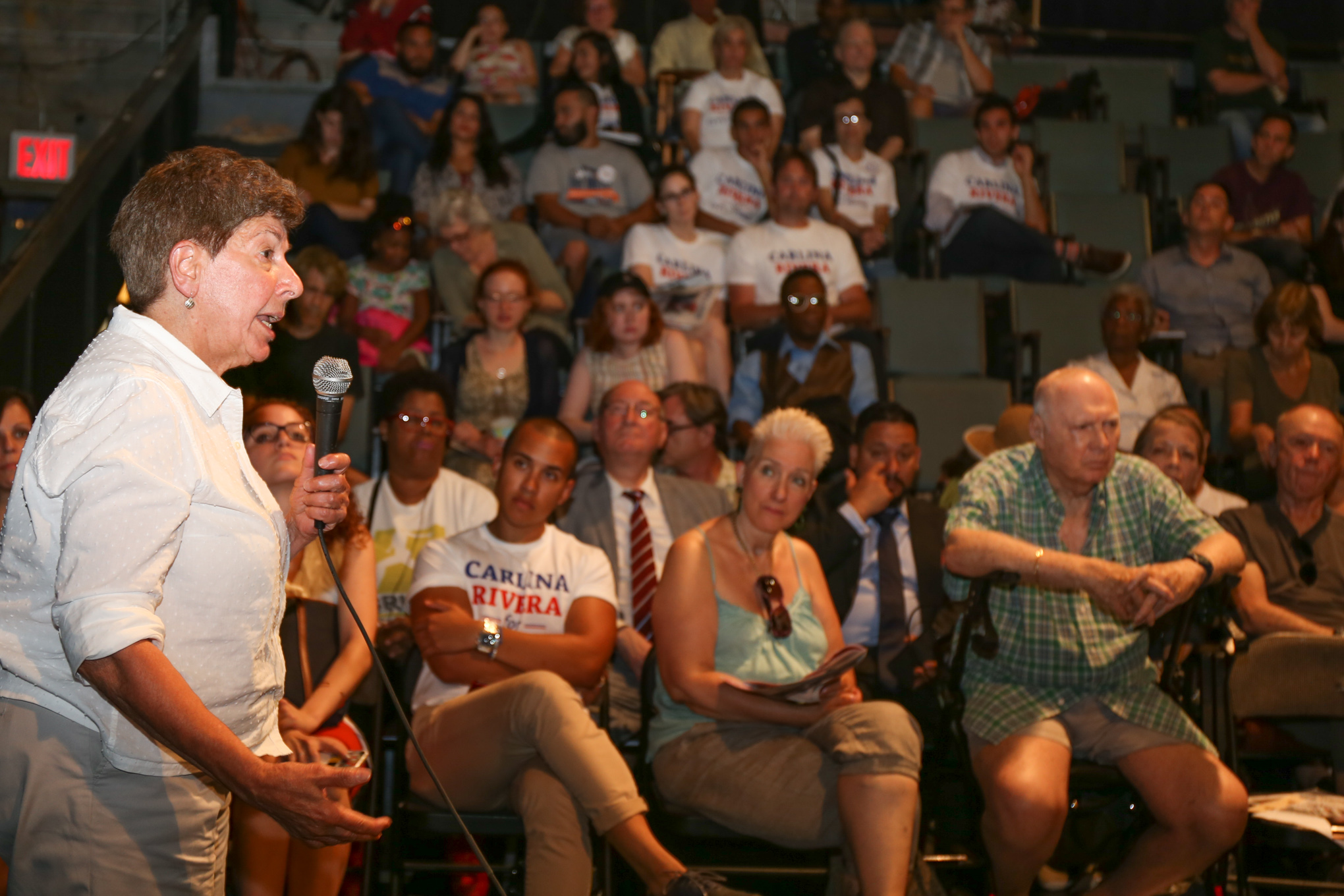
In audience questions, Susan Stetzer, district manager for C.B. 3, put Cho on the spot by asking why he had opted out of the city’s campaign-finance program, which provides generous matching funds to candidates if they reach a certain level of fundraising and if they have enough in-district contributions. Cho is actually in debt, in terms of his campaign financing, because he has spent much of his money flying to out-of-state fundraisers.
However, at the debate, Cho answered that he opted out of the matching-funds program because, basically, he felt the city could put the money to better use, “for other people, for other causes.” He went further, slamming what he called “the industrial campaign complex.”
In fact, though, he did not qualify for matching funds because he did not raise funds from at least 75 people in District 2.
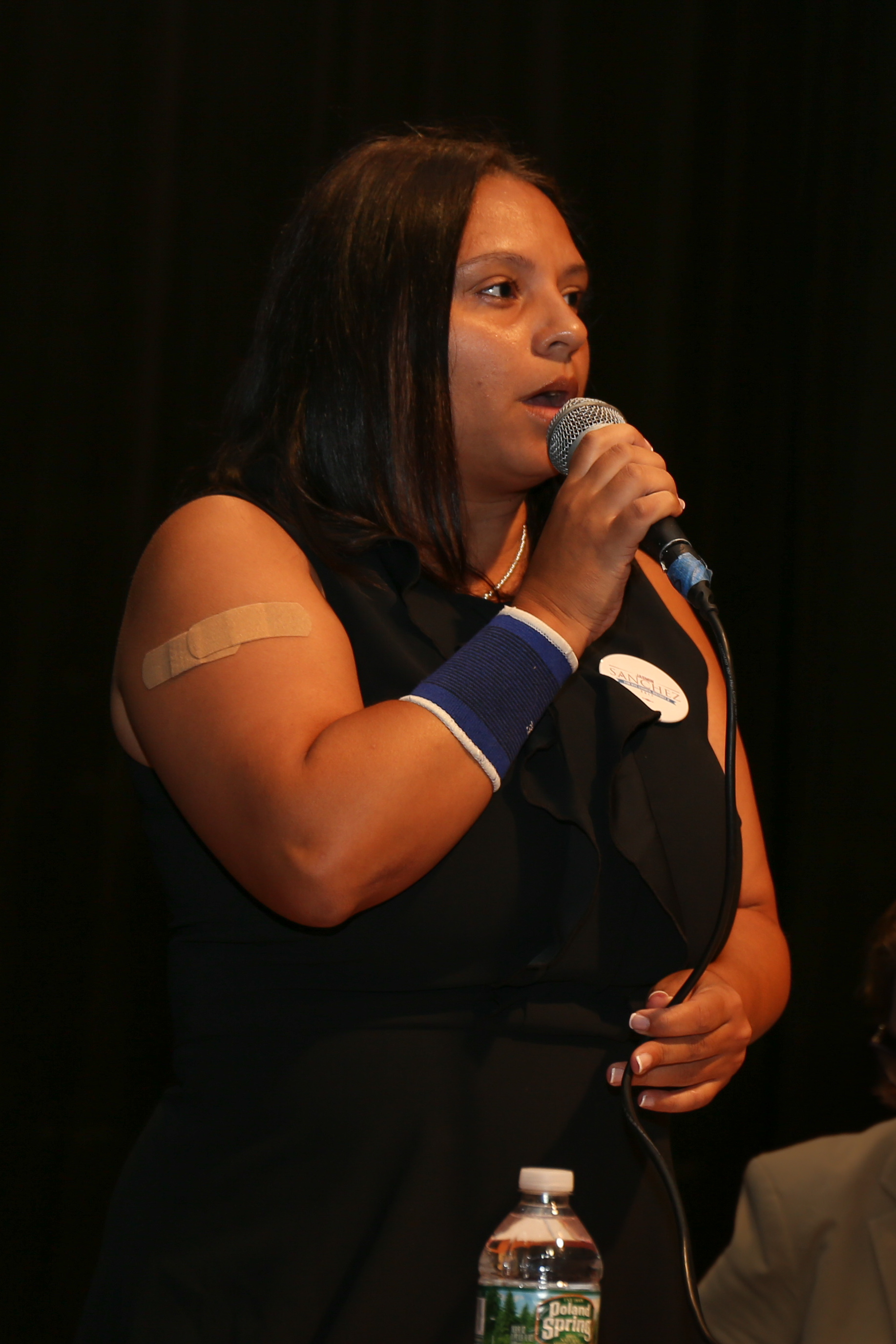
Sanchez, too, said she felt that instead of taking matching funds, the city could put it to better uses. However, Sanchez did not raise enough money to qualify for the program.
Rivera said the city’s campaign-finance program is the best in the country.
“If someone gives you $10 and you know that’s worth $70, that’s incredibly powerful,” she said, adding that matching funds “level the playing field.”
A source close to the Cho campaign later told The Villager, “From Day One, Ronnie has been focused on going door to door, asking his neighbors about their hopes and concerns for the neighborhood and not their checkbooks. It’s clear his message of bringing a new generation of leadership is resonating as evident by the 5,000-plus [ballot] petition signatures collected by our grassroots team and not an establishment political machine.”
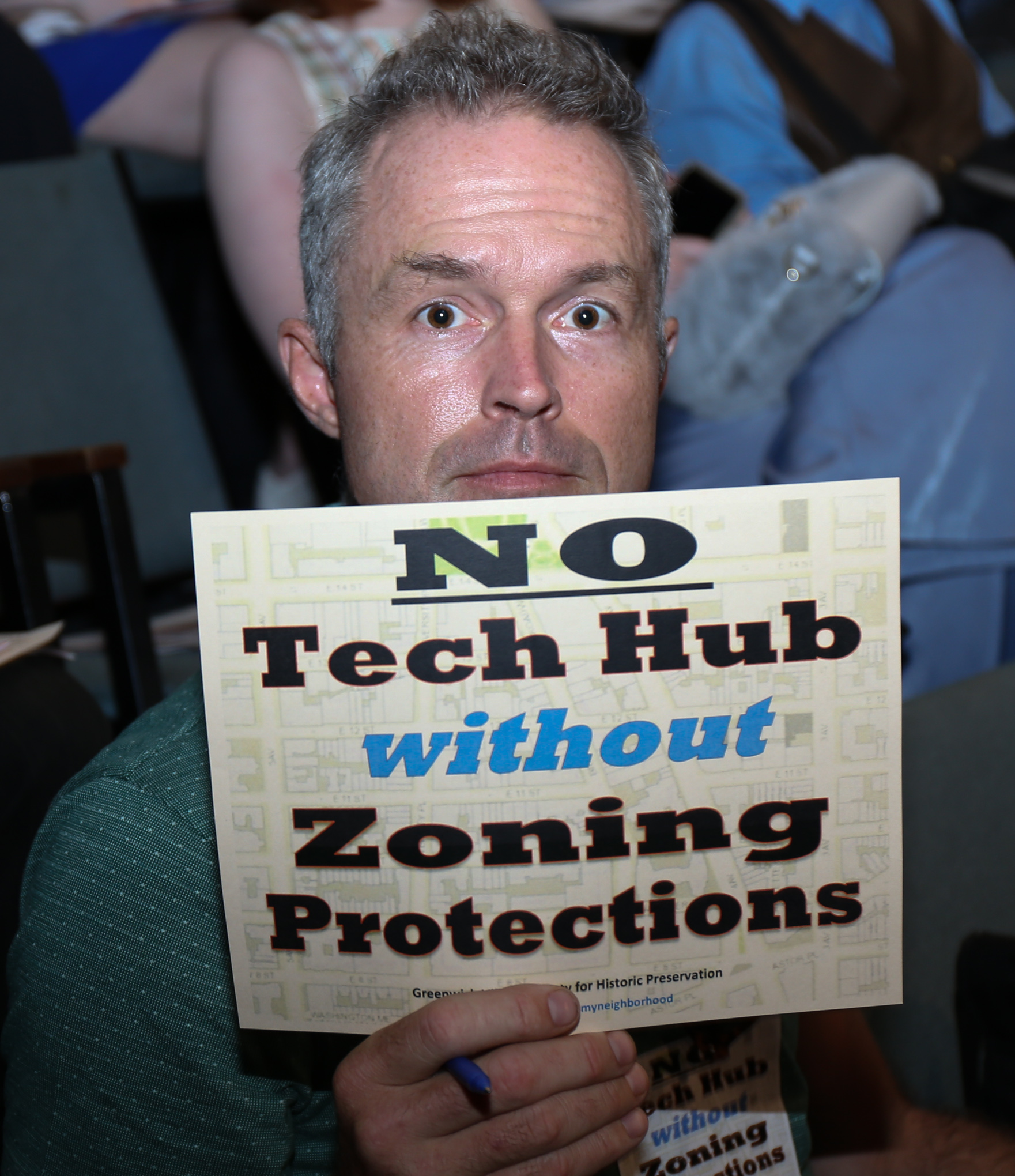
At certain points, Sanchez and Vasquez made veiled criticisms of Rivera — Sanchez referring to “the machine” and Vasquez saying that a candidate in the race had taken money from a politician who supported the planned E. 14th St. “tech hub.” In fact, Andrew Rasiej, the head of Civic Hall, the driving force behind the tech hub, has given more than $2,000 to Rivera’s campaign.
Over all, however, observers say the District 2 race has not been as “nasty” as the one in District 1, where three challengers are running to unseat Margaret Chin.
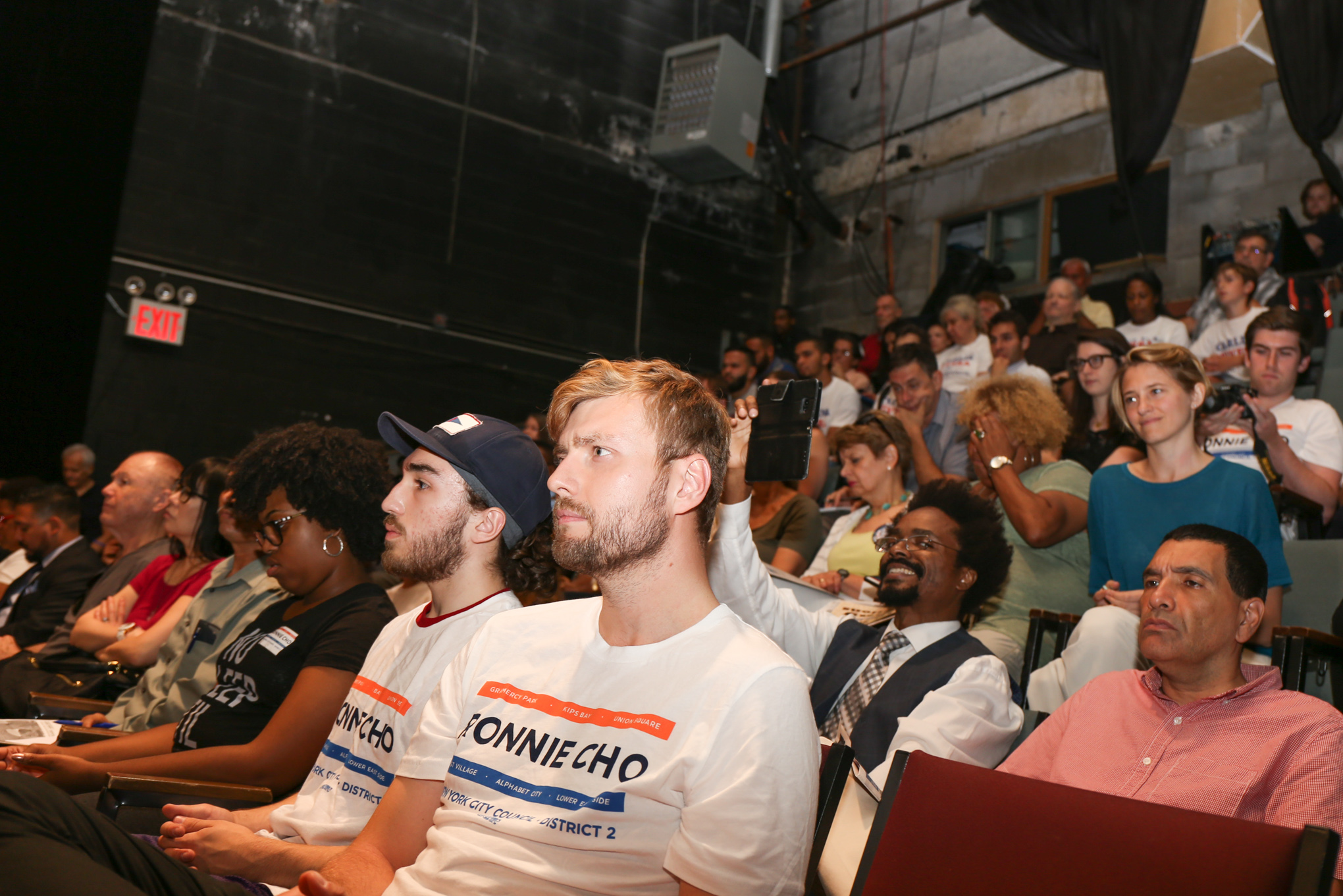
On the tech hub, Rivera she doesn’t want a “glassy building” for people who aren’t connected to the neighborhood. Cho said he was concerned it would just be for “white dudes.” Vasquez said he supports it strongly because coders’ starting salary is $75,000 and it’s a path to a better life for local youth. Silver said she wants seniors to learn coding there, too.
They all agreed: “No tech hub without zoning protections.”


































